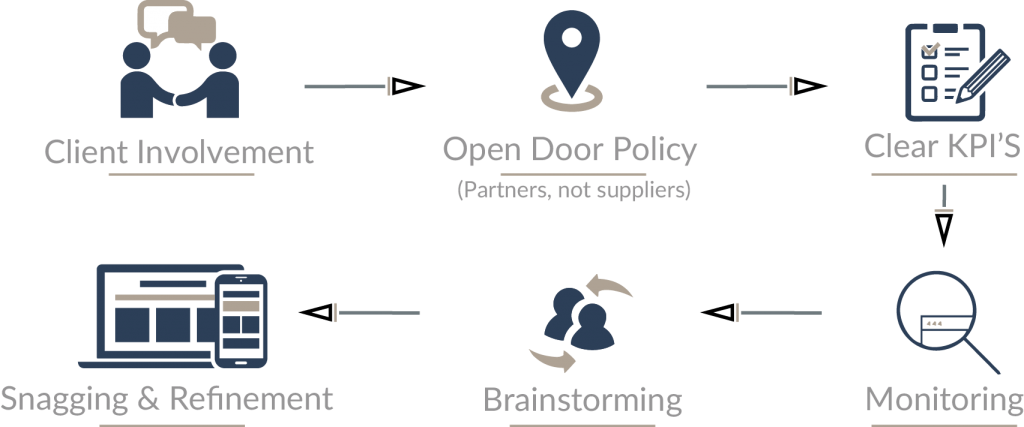Key Factors To Identify Whether Your Business Needs Customized Software

When to use custom software development services – Benefit from optimized business automation and agile work processes to enhance your brand quality.
Businesses today compete fiercely to create a special niche for their product and services to retain their competitive edge. It has become increasingly important for them to get the most out of their in-house processes to stimulate ROI generation. The reliability of in-house processes, for most organizations, depends largely upon the particular technology used and how well their IT processes are maintained.
Organizations depend upon software automation to streamline their internal processes. The better the software, the more streamlined the processes become, which leads to improved productivity levels. Therefore, it is imperative to use a computerized system that not only fulfills the business needs, but which is also affordable and easy to scale as and when businesses grow.
There’re two main choices while automating business processes:
1. Opt for ready made (bespoke) or packaged or “off-the-shelf” software
2. Design customized software specially tailored to fulfill your exact needs
While there are many benefits of choosing ready made software, the cons outweigh the benefits of using them. Ready made software applications, also referred to as commercial applications, include pre-defined functionality. They are specially designed to satisfy the needs of most business-types, so the feature functionality they offer is generic, and fails to target specific organizational requirements – which is the main cause of concern. Each business is unique and follows processes unique to its specific needs. Therefore, ready made packages tend to fulfill most organizational needs but fail when processes or the business scope changes. In such cases, one has to upgrade existing software or buy a new product offering a new set of features and functionality. This can lead to budgetary concerns as businesses might be forced to invest in new products.
So how can you determine whether your organization needs customized software or ready made applications? A few pointers may help you identify the nature of your software related needs.
1. Design and development
The main points to consider are price and the delivery time. While ready made software can be availed at affordable prices and one can start using them right away, the problem is they’re more “product” oriented rather than being “solutions” oriented. An off-the-shelf application is predominantly designed to address common business needs and directly target the end users – it is not required to focus upon any specific process or business-centric requirement. This makes commercial applications rigid and useless for organizations having very specific work processes and distinct end user requirements.
Custom software development services provide a “company focused” approach that concentrates more upon what the business actually needs and how end users are going to use a particular process. Moreover, users, stakeholders and project owners are engaged early, and more often, with the design process. Their suggestions provide useful insights in determining the scope and applicability of proposed software systems.

Another advantage of opting for customized software development is you can design a hybrid architecture consisting of ready made as well as tailor-made applications. This is possible when data is shared across the entire platform since data originating from one process often functions as an input for another.
2. Implementation
The point here is how effortlessly the organization can setup and use the new software system. A tailor-made software is generally installed by a custom software development company team along with end users working in the organization. Since developers interact and engage with process users during the development process, the latter are more conversant with project specifics, and therefore find it easy to adopt the new system.
Packaged software is usually installed by the company personnel or by third-party contractors, neither of whom are actively involved with developing the software. Training guides and instruction manuals try to make the implementation part easy, but the drawback is each process user has to be educated in using the new software system which means several hours or even days of wasted productivity time that has to be borne by the organization.
3. Processes
The point to think about is how efficiently the software can support the automation process. The ability of software to support a company’s operating processes is the most important element in deciding between custom made software and off-the-shelf applications.
A custom built, branded user interface provides customers and process users a highly personalized, tailor-made user experience. This can also help in creating an efficient channel for facilitating direct sales and creating new engagements.
custom software. This is not possible with ready made software as the process flows and automation options are already predefined and don’t have much scope for... Read more.
Businesses today compete fiercely to create a special niche for their product and services to retain their competitive edge. It has become increasingly important for them to get the most out of their in-house processes to stimulate ROI generation. The reliability of in-house processes, for most organizations, depends largely upon the particular technology used and how well their IT processes are maintained.
Organizations depend upon software automation to streamline their internal processes. The better the software, the more streamlined the processes become, which leads to improved productivity levels. Therefore, it is imperative to use a computerized system that not only fulfills the business needs, but which is also affordable and easy to scale as and when businesses grow.
There’re two main choices while automating business processes:
1. Opt for ready made (bespoke) or packaged or “off-the-shelf” software
2. Design customized software specially tailored to fulfill your exact needs
While there are many benefits of choosing ready made software, the cons outweigh the benefits of using them. Ready made software applications, also referred to as commercial applications, include pre-defined functionality. They are specially designed to satisfy the needs of most business-types, so the feature functionality they offer is generic, and fails to target specific organizational requirements – which is the main cause of concern. Each business is unique and follows processes unique to its specific needs. Therefore, ready made packages tend to fulfill most organizational needs but fail when processes or the business scope changes. In such cases, one has to upgrade existing software or buy a new product offering a new set of features and functionality. This can lead to budgetary concerns as businesses might be forced to invest in new products.
So how can you determine whether your organization needs customized software or ready made applications? A few pointers may help you identify the nature of your software related needs.
1. Design and development
The main points to consider are price and the delivery time. While ready made software can be availed at affordable prices and one can start using them right away, the problem is they’re more “product” oriented rather than being “solutions” oriented. An off-the-shelf application is predominantly designed to address common business needs and directly target the end users – it is not required to focus upon any specific process or business-centric requirement. This makes commercial applications rigid and useless for organizations having very specific work processes and distinct end user requirements.
Custom software development services provide a “company focused” approach that concentrates more upon what the business actually needs and how end users are going to use a particular process. Moreover, users, stakeholders and project owners are engaged early, and more often, with the design process. Their suggestions provide useful insights in determining the scope and applicability of proposed software systems.

Another advantage of opting for customized software development is you can design a hybrid architecture consisting of ready made as well as tailor-made applications. This is possible when data is shared across the entire platform since data originating from one process often functions as an input for another.
2. Implementation
The point here is how effortlessly the organization can setup and use the new software system. A tailor-made software is generally installed by a custom software development company team along with end users working in the organization. Since developers interact and engage with process users during the development process, the latter are more conversant with project specifics, and therefore find it easy to adopt the new system.
Packaged software is usually installed by the company personnel or by third-party contractors, neither of whom are actively involved with developing the software. Training guides and instruction manuals try to make the implementation part easy, but the drawback is each process user has to be educated in using the new software system which means several hours or even days of wasted productivity time that has to be borne by the organization.
3. Processes
The point to think about is how efficiently the software can support the automation process. The ability of software to support a company’s operating processes is the most important element in deciding between custom made software and off-the-shelf applications.
A custom built, branded user interface provides customers and process users a highly personalized, tailor-made user experience. This can also help in creating an efficient channel for facilitating direct sales and creating new engagements.
custom software. This is not possible with ready made software as the process flows and automation options are already predefined and don’t have much scope for... Read more.







Comments